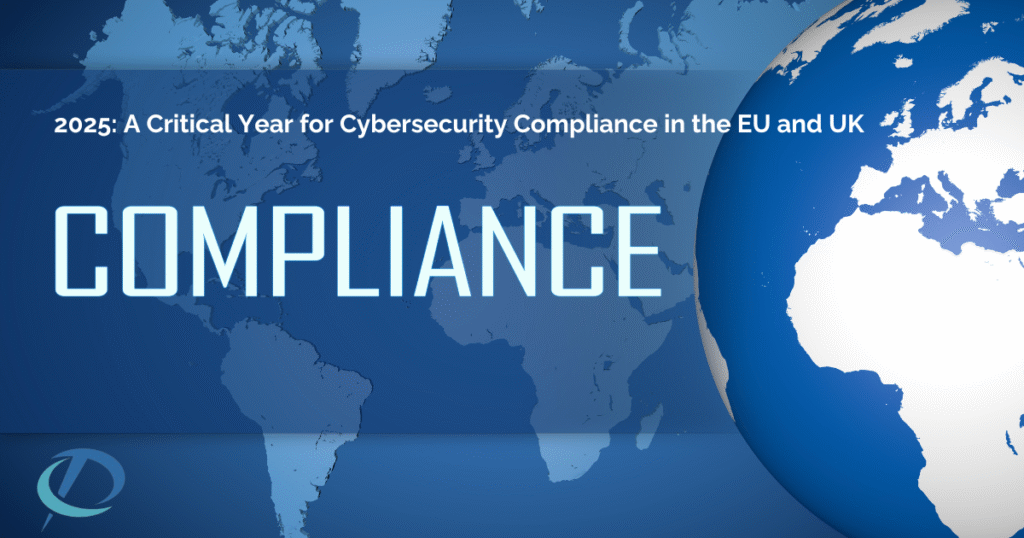Table of Contents
2025 is shaping up to be a pivotal year for cybersecurity compliance in the UK and the EU. Businesses must prepare to align with new regulations designed to counter the evolving cyber threat landscape. With stricter requirements on the horizon, it’s essential to understand what these changes mean and how they will impact your operations.
For UK businesses, this is not just a wake-up call but a directive to act now. With new laws and regulations rolling out in both the UK and EU, organisations must prepare to adapt, secure their operations, and achieve compliance. Failure to do so could result in not only financial penalties but also reputational damage and operational disruption.
Why 2025 is Critical for Cybersecurity Compliance
The cyber threat landscape has evolved dramatically, with businesses facing a surge in sophisticated attacks. According to the UK’s National Cyber Security Centre (NCSC), the volume of ransomware attacks increased by 50% in 2024 alone, while globally, the cost of cybercrime is projected to reach $10.5 trillion annually by 2025. This rapid growth in cyber threats has highlighted the urgency for businesses to enhance their cybersecurity measures.
Compounding this challenge is the advancement of technologies such as artificial intelligence, IoT devices, and 5G networks. While these technologies offer significant benefits, they also introduce new vulnerabilities. Businesses rely heavily on these systems, making it vital to have cybersecurity laws and regulations to protect against threats.
The UK’s Push for Cyber Resilience
The UK government has taken proactive measures to ensure the nation’s cyber resilience, building on its comprehensive approach to cybersecurity regulations. Through initiatives like the National Cyber Strategy 2022 and ongoing collaborations with industry leaders, the government aims to:
- Enhanced Public-Private Partnerships: This means encouraging businesses to work closely with government agencies, such as the National Cyber Security Centre (NCSC), to share information and respond quickly to threats. The UK’s NIS Regulations also promote collaboration between private and public sectors to secure critical services.
- Investing in Cyber Skills: The UK government funds programmes to close the cybersecurity skills gap. For example, CyberFirst, run by the NCSC, provides courses and competitions for students to learn cybersecurity. The Cyber Retraining Academy helps people start careers in cybersecurity. These efforts aim to prepare experts to face modern threats and secure the UK’s digital future.
A Call to Action for UK Businesses
The message to UK businesses is clear: 2025 is not the time for complacency. Building on the proactive measures discussed earlier, the UK government has laid the groundwork through updated regulations and frameworks. However, the responsibility now lies with organisations to act swiftly and align with these evolving requirements. This involves:
- Understanding Applicability: Find out which rules apply to your business. For example, if you work in finance, you need to follow DORA, and if you make IoT devices like smart home gadgets, you must comply with the PSTI Bill.
- Embedding Security by Design: Build security into your operations and products right from the start. Plan, develop, and update systems with security as a priority to protect your business and customers from threats.
- Conducting Regular Risk Assessments: Evaluate vulnerabilities in your systems and address them proactively.
- Investing in Cyber Training: Train employees regularly to spot and handle cyber threats. Training should happen at least once a year and when new threats or updates arise. Programmes like CyberFirst provide structured courses and hands-on workshops to prepare staff for real challenges.
New Cybersecurity Laws and Compliance Requirements
To address challenges like rising cyber threats, technological vulnerabilities, and stricter regulatory demands, both the UK and EU have introduced stringent cybersecurity regulations:
- NIS 2 Directive (EU): The Network and Information Security 2 Directive expands the scope of the original NIS Directive. It requires essential and important entities to adopt advanced security measures and work together to reduce cyber threats. While this is an EU regulation, the UK has retained its own version of the original NIS Directive. The UK’s Network and Information Systems Regulations focus on securing critical sectors like energy, transport, and healthcare, and they are currently under review to ensure they address evolving cyber threats and align with best practices.
- Cyber Resilience Act (EU): This EU regulation focuses on products with digital components, such as software and connected devices. It ensures these products are secure by design, meaning they are built with strong security measures from the start and maintained securely throughout their lifecycle, including development, updates, and use.
- Digital Operational Resilience Act (DORA) (EU): This EU law is designed to protect the financial sector from cyber risks. It ensures banks and other financial organisations have strong processes to manage technology risks and respond quickly to any incidents, preventing widespread issues.
- EU Cybersecurity Certification Framework: This EU system creates a standard way to certify ICT products like software and hardware. It helps businesses and consumers trust that these products meet agreed security standards across all EU countries.
- UK’s Product Security and Telecommunications Infrastructure (PSTI) Bill: This UK law focuses on improving the security of smart devices like fitness trackers and smart TVs. It ensures manufacturers build security features into their products from the start, protecting users from cyber risks.
- UK Cyber Resilience Framework: This guideline helps critical industries like energy, healthcare, and transport prepare for cyber threats. It focuses on ensuring businesses can keep running smoothly even during cyberattacks or system failures, protecting vital operations.
Cyberattacks are inevitable, but you can prepare for them. Strengthen your defences now to stay ahead of threats and protect your business. With 2025 bringing stricter cybersecurity laws, now is the time to act. Secure your operations, meet compliance requirements, and build a robust defence strategy to thrive in the ever-evolving digital landscape.




